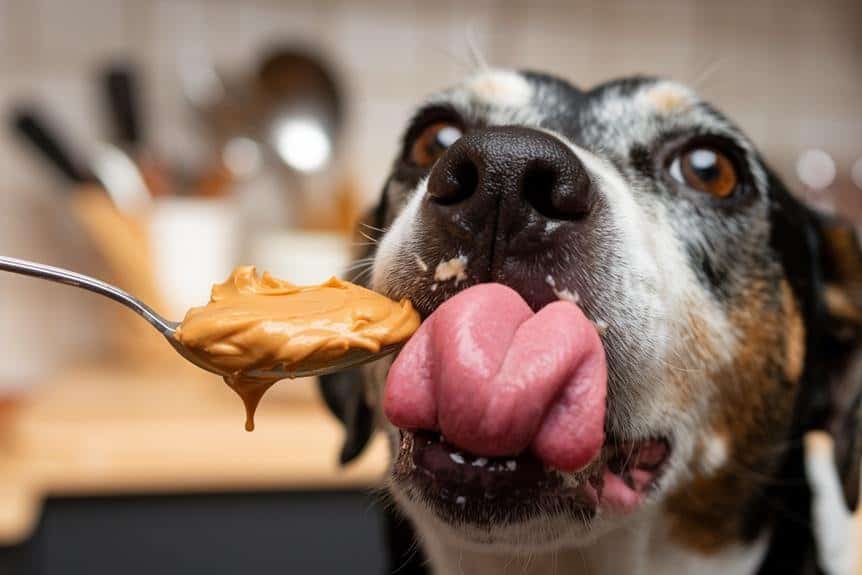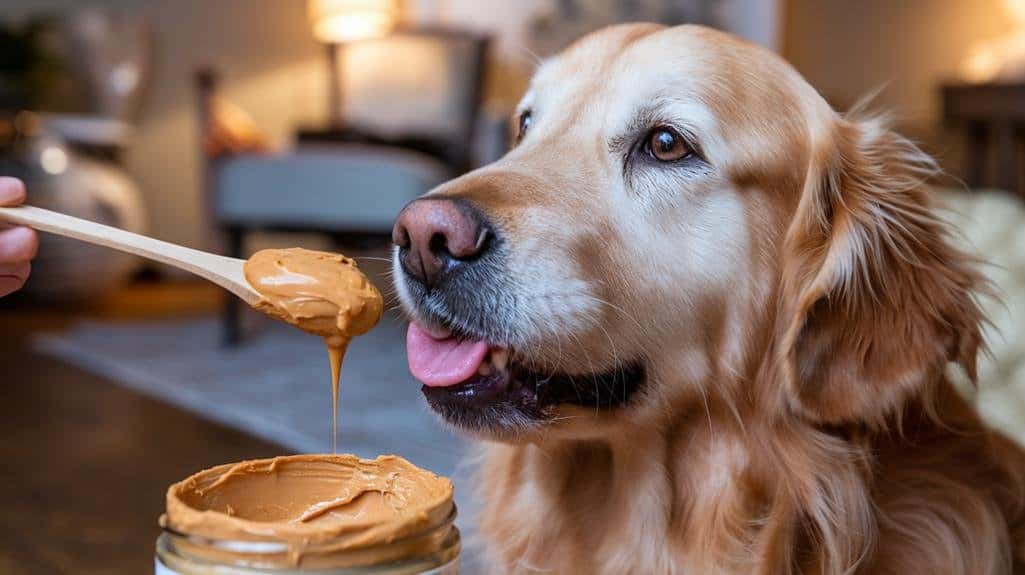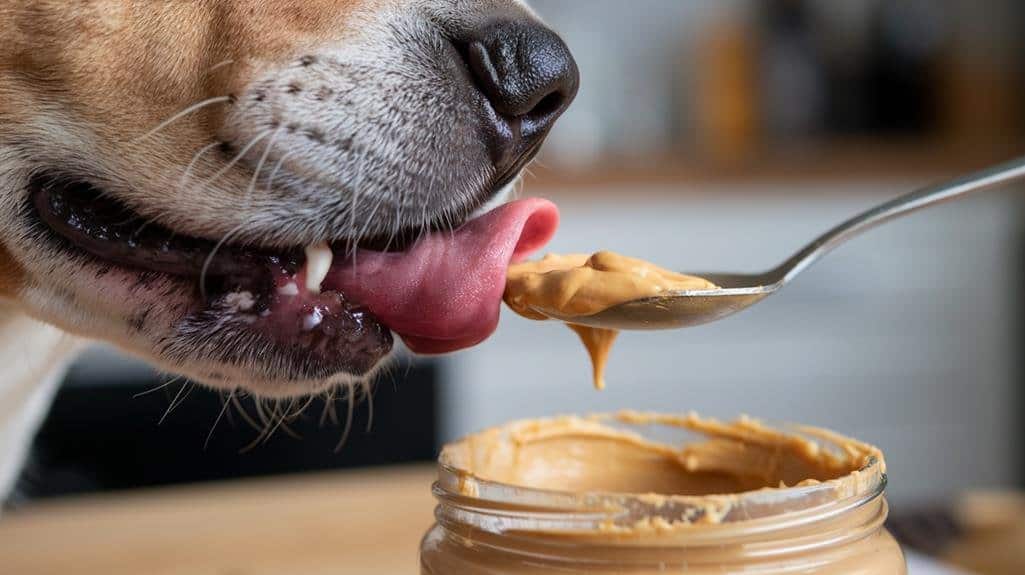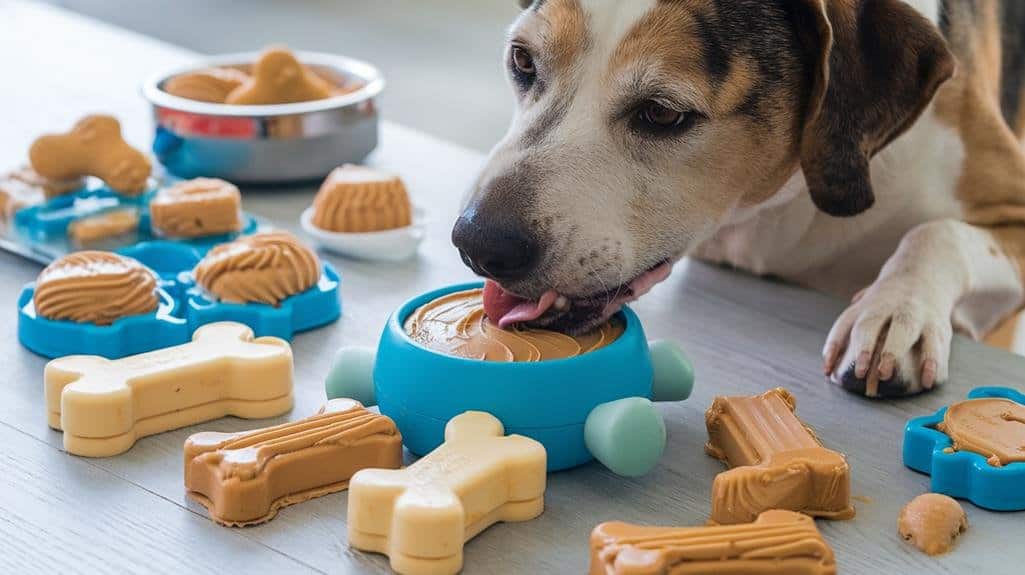Dogs love peanut butter for its irresistible taste, creamy texture, and strong nutty aroma. Their keen sense of smell, with 300 million olfactory receptors, makes the scent particularly appealing.
Peanut butter’s high fat and protein content aligns with dogs’ natural dietary instincts, satisfying their cravings for ancestral diet flavors. It’s also packed with nutrients like vitamins E and B, as well as minerals that support skin, coat, and overall health.
Appeal of Peanut Butter to Dogs

You might wonder why your dog goes crazy for peanut butter.
It’s not just the taste they love; the creamy texture and strong nutty aroma captivate their senses.
The nutritional content also plays a role, as peanut butter’s high fat and protein levels align with your dog’s natural dietary instincts.
Nutritional Value
While dogs are primarily drawn to peanut butter for its irresistible aroma and texture, the nutritional value of this tasty treat shouldn’t be overlooked. Dogs love peanut butter not just for its taste, but also for the health benefits it provides.
Peanut butter is packed with healthy fats and proteins, offering essential energy and supporting muscle health for your furry friend.
You’ll be pleased to know that peanut butter contains important vitamins and nutrients that contribute to your dog’s overall well-being. Vitamin E, niacin, and magnesium found in peanut butter can help maintain a healthy skin and coat.
The protein content, about 3-4 grams per tablespoon, aids in tissue repair and bolsters your dog’s immune system.
When choosing peanut butter for your dog, opt for natural varieties free from additives and sugars. These are easier to digest and align better with your dog’s dietary needs.
Taste and Texture
The allure of peanut butter for dogs extends far beyond its nutritional value. Its unique combination of taste and texture makes it an irresistible treat for your canine companion. Dogs are particularly drawn to the high fat and protein content in peanut butter, which aligns perfectly with their dietary preferences as omnivores.
The chewy texture of peanut butter provides a fascinating sensory experience for your dog. Its sticky and creamy consistency stimulates their curiosity and keeps them engaged as they lick and chew. This tactile element adds to the overall enjoyment of the tasty treat.
While dogs don’t have the same sweet tooth as humans, they do possess a sensitivity to sweetness. The natural sugars in peanut butter appeal to this preference, making it even more enticing. However, it’s best to opt for versions without added sugars.
Your dog’s incredible sense of smell plays a significant role in their love for peanut butter. They can detect its nutty aroma up to 100,000 times more acutely than you can, making it an irresistible olfactory experience.
This powerful scent, combined with the unique texture and fat-specific taste buds, creates the perfect storm of canine enjoyment.
Natural Instincts
Driven by their natural instincts, dogs find peanut butter irresistible for several reasons. Your furry friend’s omnivorous dietary instincts and preference for protein-rich foods align perfectly with peanut butter’s high-fat content. This natural attraction stems from their evolutionary need for energy-dense nutrition.
Your dog’s keen sense of smell plays an essential role in their love for peanut butter. With about 300 million olfactory receptors, they can detect the nutty aroma far better than you can. This heightened sensitivity to scent makes peanut butter an irresistible treat for their noses.
The combination of fat, protein, and natural sweetness in peanut butter caters to your dog’s taste preferences. It’s a nutrient-rich snack that satisfies their craving for flavors similar to those found in their ancestral diet.
When you offer peanut butter, you’ll notice your dog’s excitement through tail wagging and enthusiastic licking. These joyful behaviors reinforce their positive association with this treat, making it a favorite for both you and your canine companion.
Nutritional Benefits of Peanut Butter for Dogs

You’ll find that peanut butter offers several nutritional benefits for your dog.
It’s a great source of protein, supporting muscle health and energy levels.
Protein Source
Peanut butter’s protein-packed punch makes it a nutritional powerhouse for dogs. As a great source of easily digestible protein, it provides approximately 3-4 grams per tablespoon, supporting your furry friend’s muscle development and overall energy levels. This protein-rich treat aligns perfectly with your dog’s omnivorous diet, satisfying their nutritional needs and explaining why dogs like peanut butter so much.
The protein in peanut butter goes beyond just muscle support. It plays a significant role in skin and hair cell replacement, contributing to a healthy, shiny coat for your canine companion. Additionally, it helps strengthen their immune system, promoting overall health and well-being.
When you incorporate peanut butter into your dog’s diet, you’re not just offering a tasty treat; you’re providing a valuable protein source that can enhance their health.
Moderation is key when feeding peanut butter to dogs. It’s a great protein source, but too much can lead to extra calories. Give it in controlled portions to ensure your dog gets the benefits without upsetting their diet.
Healthy Fats
A nutritional powerhouse, peanut butter offers more than just protein for your canine companion. It’s packed with healthy fats that provide numerous benefits for your dog’s overall well-being. These fats serve as an excellent energy source, fueling your pup’s active lifestyle and playful antics.
When you incorporate peanut butter into your dog’s diet, you’re not just offering a tasty treat. The high fat content aids in nutrient absorption, helping your furry friend make the most of essential vitamins found in their regular dog foods.
Natural peanut butter, in particular, contains monounsaturated fats that can support your dog’s heart health when given in moderation.
You’ll also notice improvements in your dog’s appearance. The healthy fats in peanut butter contribute to maintaining a shiny coat and healthy skin, enhancing your pet’s overall look.
While protein is vital for muscle health and tissue repair, the combination of protein and healthy fats in peanut butter creates a well-rounded nutritional profile.
Vitamins and Minerals
Beyond healthy fats, peanut butter offers dogs a wealth of vitamins and minerals that support their overall health. When you give your furry friend a spoonful of this creamy treat, you’re providing them with essential nutrients that contribute to their well-being.
Peanut butter is rich in Vitamin E, which promotes healthy skin and a lustrous coat. It also contains B vitamins that play a significant role in your dog’s energy metabolism, helping them stay active and playful.
Moreover, peanut butter is packed with minerals like magnesium and potassium. These minerals are essential for proper muscle function and help maintain a healthy metabolism in dogs.
The digestibility of peanut butter guarantees that your dog can efficiently absorb these nutritional benefits, making it an excellent snack choice.
Safety Considerations When Feeding Peanut Butter to Dogs

While peanut butter can be a tasty treat for your dog, you’ll need to be aware of potential dangers.
Check the ingredient list for xylitol, a sugar substitute that’s toxic to dogs, and always choose organic, additive-free options.
Remember to offer peanut butter in moderation and watch for any signs of allergies to guarantee your pup’s safety and well-being.
Xylitol Awareness
Occasionally, a dog’s love for peanut butter can lead to dangerous situations if pet owners aren’t vigilant about ingredients. Xylitol, a sugar substitute found in some peanut butter products, poses a significant threat to your canine companion. This artificial sweetener is highly toxic to dogs, even in small amounts, and can cause rapid hypoglycemia and potential liver failure.
When choosing peanut butter for your dog, it’s essential to carefully read labels and avoid any products containing xylitol.
Symptoms of xylitol poisoning in dogs include:
- vomiting
- lethargy
- loss of coordinationand seizure
If you suspect your dog has consumed xylitol-containing peanut butter, seek immediate veterinary attention.
To guarantee your dog’s safety, opt for natural peanut butter without additives or sugar. However, always consult with your veterinarian if you’re unsure about a specific brand’s safety or if your dog has ingested a product containing xylitol.
Moderation is Key
Peanut butter enthusiasts must remember that moderation is vital when feeding this tasty treat to their canine companions.
While dogs love the rich aroma and creamy texture of peanut butter, it’s important to limit their intake due to its high calorie content. To maintain a balanced diet, make sure that peanut butter doesn’t exceed 10% of your dog’s daily caloric intake.
When serving peanut butter to your furry friend, portion control is key. For large dogs, offer less than a teaspoon, while small dogs should receive about one-eighth of a teaspoon.
Always choose natural peanut butter without added sugars or artificial sweeteners to guarantee your dog’s safety and health.
Potential Allergies
Despite its popularity, peanut butter can pose risks for some dogs. While most canines love this creamy treat, it’s essential to be aware of potential allergies. Just like humans, dogs can develop allergies to peanuts, which may lead to various symptoms ranging from mild discomfort to severe reactions.
When introducing peanut butter to your dog’s diet, start with small amounts and carefully monitor their response. Watch for signs of itching, swelling, or gastrointestinal upset. In rare cases, dogs may experience anaphylaxis, a life-threatening allergic reaction requiring immediate veterinary attention.
To minimize risks, choose natural peanut butter without additives, especially xylitol, which is toxic to dogs. Always consult your veterinarian before making peanut butter a regular treat, particularly if your dog has a history of food sensitivities.
Keep a log of new foods in your dog’s diet, including peanut butter, to help identify potential allergies or sensitivities over time. If you notice any adverse reactions, discontinue use immediately and seek professional advice.
Creative Ways to Serve Peanut Butter to Dogs

You can make peanut butter even more exciting for your dog with some creative serving methods.
Stuffed Toys
One of the most entertaining and rewarding ways to serve peanut butter to your furry friend is through stuffed toys. These interactive playthings not only provide mental stimulation but also offer a fun and engaging way to enjoy this beloved treat. By filling toys with peanut butter, you’re creating an exciting challenge that’ll keep your dog occupied for extended periods.
Choose toys with irregular shapes to encourage your pup to roll and manipulate them, enhancing their problem-solving skills as they work to extract the tasty reward. For an extra challenge and a revitalizing twist, try freezing the peanut butter inside the toy. This creates a longer-lasting treat that provides both a cooling effect and an additional test of your dog’s persistence.
Stuffed toys also offer an excellent opportunity for portion control. You can manage your dog’s calorie intake while still providing a rewarding experience.
Interactive play sessions with peanut butter-filled toys not only provide treats but also enrich your dog’s routine and strengthen your bond with them.
Homemade Treats
Making homemade treats is a great way to serve peanut butter to your dog. Mix natural peanut butter with whole wheat flour, eggs, and oats to create tasty dog-friendly cookies. These nutritious snacks satisfy your dog’s peanut butter cravings while being healthy.
For a revitalizing summer treat, blend peanut butter with yogurt and freeze the mixture in molds. This creates a cool, tasty snack that’ll keep your dog entertained and hydrated during hot weather.
You can also spread peanut butter on apple slices or carrot sticks for a quick and healthy treat, ensuring you use peanut butter without added sugars or xylitol.
Get even more creative by making homemade dog biscuits flavored with peanut butter and other nutritious ingredients like pumpkin or sweet potatoes. These combinations not only enhance the taste but also boost the nutritional value of the treats.
Frequently Asked Questions
Why Is My Dog Obsessed With Peanut Butter?
Your dog’s obsession with peanut butter stems from its irresistible aroma, rich texture, and protein content. It’s a treat that engages their senses, provides mental stimulation, and reinforces positive associations with you, their beloved owner.
Is It Safe for Dogs to Eat Peanut Butter?
Yes, it’s generally safe for your dog to eat peanut butter, but you’ll need to be cautious. Choose natural varieties without xylitol, an artificial sweetener that’s toxic to dogs. Give it in moderation and always check the ingredients list.
Why Do Dogs Lick Peanut Butter?
You’ll notice dogs lick peanut butter because of its creamy texture and enticing aroma. They’re drawn to its rich flavor, and their keen sense of smell detects it easily. It’s a tasty, engaging treat that keeps them entertained.
Does Peanut Butter Calm Dogs?
Yes, peanut butter can calm dogs. You’ll find it’s an effective distraction during stressful situations, providing comfort and reducing anxiety. It encourages licking, which promotes relaxation, and its enjoyment releases endorphins, enhancing your dog’s mood and overall well-being.

